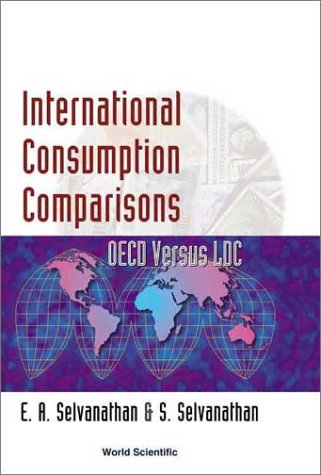

Most ebook files are in PDF format, so you can easily read them using various software such as Foxit Reader or directly on the Google Chrome browser.
Some ebook files are released by publishers in other formats such as .awz, .mobi, .epub, .fb2, etc. You may need to install specific software to read these formats on mobile/PC, such as Calibre.
Please read the tutorial at this link. https://ebooknice.com/page/post?id=faq
We offer FREE conversion to the popular formats you request; however, this may take some time. Therefore, right after payment, please email us, and we will try to provide the service as quickly as possible.
For some exceptional file formats or broken links (if any), please refrain from opening any disputes. Instead, email us first, and we will try to assist within a maximum of 6 hours.
EbookNice Team

Status:
Available0.0
0 reviews(Ebook) International consumption comparisons OECD versus LDC 1st Edition by EA Selvanathan, S Selvanathan - Ebook PDF Instant Download/Delivery: 9789810240059 ,9810240058
Full download (Ebook) International consumption comparisons OECD versus LDC 1st Edition after payment

Product details:
ISBN 10: 9810240058
ISBN 13: 9789810240059
Author: EA Selvanathan, S Selvanathan
(Ebook) International consumption comparisons OECD versus LDC 1st Edition Table of contents:
CHAPTER 1: AN OVERVIEW OF INTERNATIONAL CONSUMPTION PATTERNS
1.1 An Overview of the OECD and LD Countries
1.2 Consumption Theory
1.3 A Review of International Consumption Comparisons
1.4 A Pioneering International Consumption Study
1.5 Are Tastes Constant?
References
CHAPTER 2: CONSUMER DEMAND MODELS
2.1 The Economic Theory of the Consumer
2.2 The Structure of Preferences
2.3 Differential Approach to Deriving Demand Equations
2.4 Other Popular Demand Systems
2.5 More on the Differential Demand Equations
2.6 Aggregation and Consumer Demand
References
CHAPTER 3: DATA ANALYSIS: OECD COUNTRIES
3.1 Data Source
3.2 Summary Measures
3.3 Engel's Law
3.4 Preliminary Estimates of Income and Price Elasticities
3.5 Preliminary Estimates of the Income Flexibility
3.6 Testing the Frisch's Conjecture
3.7 The Validity of Preference Independence
References
CHAPTER 4: DATA ANALYSIS: LESS DEVELOPED COUNTRIES
4.1 Data Source
4.2 Summary Measures
4.3 Engel's Law
4.4 Preliminary Estimates of Income and Price Elasticities
4.5 Preliminary Estimates of the Income Flexibility
4.6 Testing the Frisch's Conjecture
4.7 The Validity of Preference Independence
References
CHAPTER 5: A COMPARISON OF CONSUMPTION PATTERNS IN THE OECD AND LD COUNTRIES
5.1 Summary Measures
5.2 Empirical Regularities
5.3 Conclusion
CHAPTER 6: STOCHASTIC PRICE AND QUANTITY INDEX NUMBERS
6.1 An Unweighted Average of Prices
6.2 A Budget-Share-Weighted Average of Prices
6.3 The Extended Model
6.4 A Two-Step Estimation Procedure: Step 1
6.5 A Two-Step Estimation Procedure: Step 2
6.6 An Extension
6.7 Application of Stochastic Index Numbers to OECD and LDC
6.8 Conclusion
References
CHAPTER 7: TESTING DEMAND THEORY HYPOTHESES: OECD AND LD COUNTRIES
7.1 The Demand Model
7.2 Demand Homogeneity
7.3 Slutsky Symmetry
7.4 Summary Results
References
CHAPTER 8: A COMPARISON OF ALTERNATIVE DEMAND SYSTEMS
8.1 Four Demand Systems
8.2 Measure of Goodness-of-fit
8.3 The Preferred Demand System
8.4 Conclusion
References
CHAPTER 9: THE STRUCTURE OF PREFERENCES: OECD AND LD COUNTRIES
9.1 The Demand Model
9.2 Model Estimation
9.3 Estimation Results
9.4 Testing Preference Independence
9.5 Implied Income and Price Elasticities
9.6 Conclusion
References
APPENDIX: THE DEMAND ANALYSIS PACKAGE DAP2000
A.1 Using the Package
A.2 Input Options
A.3 Preliminary Data Analysis
A.4 Hypothesis Testing and Estimation
A.5 The Matrix Approach to Simulation
References
INDEX
People also search for (Ebook) International consumption comparisons OECD versus LDC 1st Edition:
oecd comparative price levels
do oecd or non-oecd countries have the highest consumption rates
oecd international comparisons
on what are most ldcs’ economies dependent
international comparison pdf
Tags: EA Selvanathan, S Selvanathan, International consumption, comparisons, OECD versus LDC